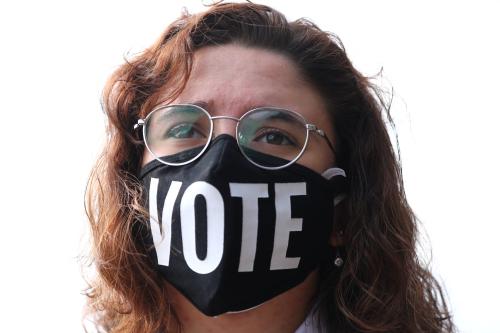Discussion of racial issues has intensified in recent years, with vigorous debates emerging at the national and local level over once obscure academic arguments such as critical race theory. At the core of much of the discussion is how we should confront America’s history of slavery and racism. As this debate continues, a recently released report from the Pew Research Center sheds new light on the question.
Here are the core findings: Although 48% of Americans think that the country has made real progress on race over the past 50 years, 50% say that a lot more needs to be done, 57% believe that whites benefit from advantages that Black Americans lack, and 53% view increased attention to slavery and racism as positive for society.
Beneath these aggregate statistics, there are significant differences among different groups in the population, mainly along racial, partisan, age, and educational lines. For example, 46% of whites think that giving increased attention to slavery and racism is a good thing, compared to 75% of Blacks, 59% of Hispanics, and 64% of Asians. The partisan gap is large: 78% of Democrats favor highlighting slavery and racism, versus just 25% of Republicans. Young adults are 19 percentage points more likely to approve than seniors—no doubt a reflection of the fact that, as we know from the recent census results, younger Americans are more diverse than older Americans. The same gap divides the most- and least-educated Americans.
Racial and partisan differences profoundly affect perceptions of history and the present. Fifty-six percent of whites say that America has made a lot of progress on racial issues, compared to just 19% of Blacks. Conversely, 78% of Blacks say that a lot more needs to be done, versus 42% of whites. Similarly, 71% of Republicans say that we have made a lot of progress, and only 22% believe that a lot more is left to be done. The corresponding figures for Democrats are 29% and 74%, respectively.
On the issue of white privilege, the patterns are much the same. Virtually all Black Americans believe that white people benefit from advantages that Blacks lack; only 47% of whites agree.
Three findings help us understand what is likely to drive changes over time.
- Education has a big impact on white Americans’ racial attitudes. For example, 59% of whites with college degrees believe that increased attention to slavery and racism is a good thing, versus 40% of non-college whites. Similarly, 49% of college-educated whites, compared to 38% of non-college whites, say that a lot needs to be done to ensure equal rights for all Americans. And 58% of college-educated whites say that whites enjoy advantages that Blacks lack; only 39% of whites without college degrees agree. By contrast, education has almost no impact on racial perceptions among Black and Hispanic respondents.
- Demographic shifts among Republicans may affect the party’s racial outlook during the next generation. The 2020 elections showed Republicans making significant gains among Hispanics, especially those with less than a college education. But Hispanic Republicans differ from white Republicans on racial issues. For example, they are twice as likely as white Republicans to believe that increased attention to racial issues is good for our society. And 46% of Hispanic Republicans affirm the existence of white privilege, compared to just 20% of white Republicans. Similarly, 42% of Republican young adults endorse the new focus on slavery and racism; only 18% of Republican seniors agree.
- Radical changes to improve the circumstances of racial and ethnic minorities do not enjoy majority support. Although 50% of Americans say that a lot remains to be done to ensure equal rights for all, only 25% believe that American laws and institutions need to be completely rebuilt because they are structurally biased against racial and ethnic minorities. An equal number of Americans—a quarter of the population—believe that the changes we need can be attained within the existing system.
In sum, despite multiple divisions among the American people, the current state of public opinion will sustain reforms to improve the standing of racial and ethnic groups, and demographic changes may increase support for such measures during the next generation. This said, reform-minded groups must remain aware of limited public support for changes the people regard as going too far, such as defunding the police.
The Brookings Institution is committed to quality, independence, and impact.
We are supported by a diverse array of funders. In line with our values and policies, each Brookings publication represents the sole views of its author(s).







Commentary
How should we address the US’s history of slavery and racism? Here’s what Americans think.
August 17, 2021